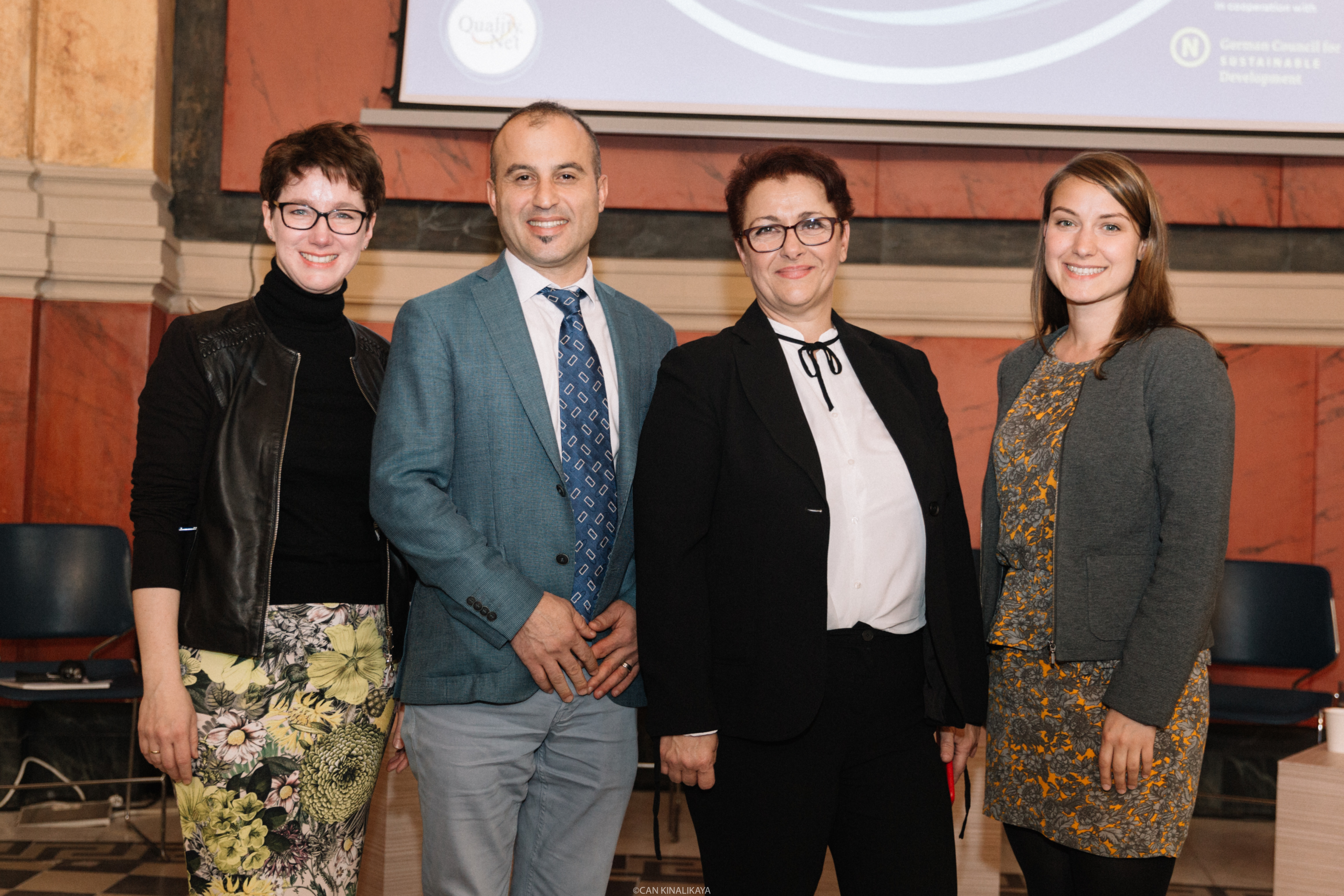The German Council for Sustainable Development (RNE) is continuing the European dialogue on sustainability: a conference in Athens focuses on the topic of sustainable finance and the reporting of companies’ non-financial performance as well as examining how the Sustainable Development Goals of the United Nations can be integrated into education.

Different countries, common objectives (left to right): Yvonne Zwick (Deputy Secretary General RNE and head of the Sustainability Code), Hüdai Kara (Director Turkish Sustainability Code), Chrysoula Exarchou (CEO QualityNet Foundation & Head of the Greek Code), Julia Graner (Project Manager, Turkish Sustainability Code), Foto: Can Kinalikaya
“None of the various stakeholder groups involved will be able to achieve the transformation towards sustainability alone.” In her keynote speech at the Athens Sustainability Outlook, Yvonne Zwick, Deputy Secretary-General of the RNE, highlighted this key philosophy as the foundation for the European conference. This was particularly true, she noted, in times where pressure is being felt from two sides: on the one hand from the younger generation, which is demanding effective action against climate change, and on the other from groups that do not see or want to see the advantages a globalised world provides.
It was against this backdrop that some 120 experts came together in Athens in early April to continue specifically the pan-European stakeholder dialogue on the topic of sustainable development and corporate responsibility and to identify important evolving trends. The results of the conference will be presented to the European Commission with the aim of bolstering it in its drive to achieve the Sustainable Development Goals (SDGs) set out by the United Nations. The two-part event comprised a stakeholder dialogue format with a smaller group of participants as well as a public conference the following day. It was organised by QualityNet Foundation (QNF), a non-profit organisation promoting sustainable development in Greece, and the RNE. Guests in attendance hailed in particular from Greece but also came from Belgium, the Netherlands, France and the Balkan countries
The Sustainability Code as a blueprint for other countries?
As one of the 31 speakers at the conference, Greek Deputy Minister for the Environment, Socratis Famellos, criticised the fact that prosperity is still not measured adequately. He would like to see an increase in indices that also reflect social and ecological aspects. Moreover, approaches of this kind are not yet widespread in the business sector, as was illustrated by the statement from Spyros Lioukas, professor of science & technology management at Athens University of Economics and Business, who gives business schools in general an “F” – the worst possible grade – in the area of ethics.
Thematically the discussions in Athens focused in particular on sustainable finance and the reporting of companies’ non-financial performance. “We talked about other countries’ interest in establishing an instrument similar to the Sustainability Code in Germany,” comments Zwick, who also leads the Code’s office. Some three years ago, following a two-year development process, Greece became the first country in Europe to introduce its own Sustainability Code based on the German example. At the conference, Hellenic Petroleum, Lidl Hellas and the Deutsche Telekom subsidiary OTE-COSMOTE all reported on their practical experiences of using the Greek Code. Most recently, Turkey joined the ranks and is now inviting companies to use the Turkish Sustainability Code as an instrument to support their entry into sustainability reporting and the development of a sustainability strategy.
A sustainable “New Deal” for Europe
Again and again, the participants came back to the question of whether, and how, a sustainable “New Deal” could work for Europe. They put forward that Europe would need to take a leadership role in the areas of circular economy and an inclusive fair market economy. Concretely, they discussed the suggestion that a “sustainability passport” be introduced for enterprises. Further stakeholder dialogue events will be dealing with this topic over the months to come, possibly resulting in the presentation of an initial draft proposal for the European Commission.